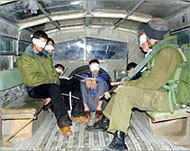Israeli raids undermine ceasefire talks
Israeli occupation forces seized around 140 Palestinians early on Tuesday, drawing Palestinian charges that Israel was trying to undermine efforts to reach a ceasefire.

 |
| Occupation troops rounded up around 130 Palestinians |
Occupation forces swept into the West Bank city of Hebron, arresting scores of people they claimed to be members of the resistance group Hamas.
Women and elderly men were among those taken away, and many were under 16, reported the Islamic Association of Palestine.
Israel is already holding as many as 8000 Palestinians in internment.
The internees, most of whom are detained without charge or trial, are systematically maltreated and often tortured.
Overnight, occupation forces also closed off the old city, home to several hundred fanatical Jewish settlers after clashing with resistance fighters.
At least 19 Palestinians were also detained in the West Bank cities of Nablus, Bethlehem and Tulkarm, Aljazeera correspondent reported.
“We are facing a Zionist assault and it is not logical to ask us to accept a truce under these conditions”, said Abd al-Aziz al-Rantissi, a prominent Hamas leader.
Al-Rantissi survived an Israeli attempt on his life on 10 June.
The raids in Hebron and Nablus added to the tensions surrounding the stumbling steps to implement a US-sponsored “road map” plan.
The plan aims at ending the Palestinian intifadah (or uprising) and calls for establishing a Palestinian state by 2005.
“It is an Israeli madness aimed at undermining any move forward”, Palestinian Cabinet Minister Yasser Abd Rabbo said.
“These arrests are an attempt to sabotage the understanding with Hamas. Israel does not want a ceasefire”, he said.
Hamas and other Palestinian resistance groups were on the verge of agreeing to a ceasefire when the Israeli raids occurred, Palestinian officials said.
 |
| Abd Allah offers mediation role |
Palestinian Prime Minister Mahmoud Abbas has been trying to persuade Hamas and other resistance groups to accept a temporary ceasefire agreement with Israel.
Abbas was hoping a truce would pave the way for implementing the “road map”, affirmed at the Aqaba summit on June 4.
King Abd Allah of Jordan said in comments published on Tuesday that his country could help broker a ceasefire if Israel stopped its assassination policy.
“Jordan can do that, but before this Israel must begin by taking serious steps such as stopping assassinations, masspunishment and destroying homes”, he told the London-based al-Hayat daily.
Arabs indicted
Meanwhile, five Israeli Arabs belonging to the Israeli Islamic Movement were indicted over alleged funding of Hamas.
Four of the accused were charged with “belonging to a radical terrorist organisation”, “contacts with foreign agents” and “plotting criminal acts”.
The leader of the movement, Raed Salah, is among the four.
Only the last two charges were levelled against Suleiman Aghbariyeh, the mayor of the northern Arab town of Umm al-Fahm in Israel.
Its residents hold the Israeli citizenship like other Palestinians who stayed after the state of Israel was established.
New outpost
In the meantime, Jewish settlers set up a new outpost to replace a settlement removed by Israeli forces last week, Israeli public radio reported.
They named it “Givat Ariel” after Israeli Prime Minister Ariel Sharon, who has been the architect of Israel’s settlement policy for decades.
Aljazeera correspondent said Jewish settlers established nine outposts while Israeli forces dismantled only eight since 9 June.
Israel began dismantling the so-called “rogue” settlements – those not authorised by the state – erected after March 2001, in compliance with the “road map”.
All Jewish settlements are illegal under international law.